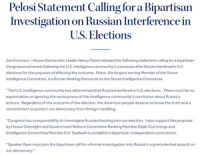-
Russia is targeting Europe’s elections. So are far-right copycats.
Less than two weeks before pivotal elections for the European Parliament, a constellation of websites and social media accounts linked to Russia or far-right groups is spreading disinformation, encouraging discord and amplifying distrust in the centrist parties that have governed for decades. Matt Apuzzo and Adam Satariano write in the New York Times that the activity offers fresh evidence that despite indictments, expulsions and recriminations, Russia remains undeterred in its campaign to widen political divisions and weaken Western institutions. “The goal here is bigger than any one election,” said Daniel Jones, a former F.B.I. analyst and Senate investigator. “It is to constantly divide, increase distrust and undermine our faith in institutions and democracy itself. They’re working to destroy everything that was built post-World War II.”
-
-
Hysteria over Jade Helm exercise in Texas was fueled by Russians, former CIA director says

Gov. Greg Abbott’s decision in 2015 to ask the Texas State Guard to monitor a federal military exercise prompted significant criticism. A former CIA director said Wednesday that the move emboldened Russians to next target elections.
-
-
Breaking down the anti-vaccine echo chamber
In these days of Facebook and Twitter, it is easy enough to block out the opinions of those you disagree with, and only associate with people whose voices reinforce your own opinions. These echo chambers have real-world implications; currently, the U.S. is in the midst of its largest measles outbreak in decades. That’s why it’s important to find ways to communicate across the vaccination divide.
-
-
Agents of deceit: Russian disinformation institutions and actors

There is a burgeoning Western literature on Russian policy and practice in disinformation, but very little of it has detailed and reliable material about the government agencies and affiliated actors that promote it. A new, detailed report investigates the institutions and actors involved in Russian disinformation.
-
-
Why do some people believe the Earth is flat?
Why, despite overwhelming scientific evidence to the contrary, is the flat-Earth movement gaining traction in the twenty-first century? One expert says that, in part, it is due to a general shift toward populism and a distrust in the views of experts and the mainstream media. There is an “increasing distrust in what we once considered to be the gatekeepers of knowledge – like academics, scientific agencies, or the government,” she says. In this kind of environment, “it becomes really easy for once-fringe views to gain traction.”
-
-
Russia’s long game: Paralyze Europe’s ability to act in its own self-interest
With the European parliamentary elections approaching in less than a month’s time, Russia’s persistent disinformation campaign to subvert and undermine Europe’s democratic institutions is a source of growing worry. Russia is playing a long game in Europe: its objective is not merely to influence the outcome of any particular election, but rather to broadly subvert the efficacy of Europe’s democratic institutions, fuel widespread social fragmentation and mistrust, and ultimately paralyze Europe’s ability to act in its own self-interest and to defend our values.
-
-
Christchurch-style terrorism reaches American shores
In wake of the attack at Chabad synagogue of Poway, California, it is important to examine digital communications surrounding the shooting and what they suggest about future terrorist activity.
-
-
Influence operations in the digital age
Influence operations in the digital age are not merely propaganda with new tools. They represent an evolved form of manipulation that presents actors with endless possibilities — both benign and malignant. While the origins of this new form are semi-accidental, it has nonetheless opened up opportunities for the manipulation and exploitation of human beings that were previously inaccessible. Zac Rogers, Emily Bienvenue, and Maryanne Kelton write in War on the Rocks that digital influence operations, now conducted across the whole of society, indicate that we are only at the beginning of a new era of population-centric competition. With regard to propaganda, the fundamental distinction between the old and the new lies in the difference between participatory and passive forms of information consumption.
-
-
Studying Russian disinformation campaigns
An interdisciplinary research team from communications, anthropology, and political science will study Russian disinformation campaigns in three former Soviet republics as part of a $1.6 million Minerva research grant awarded through the U.S. Department of Defense.
-
-
Tech fixes cannot protect us from disinformation campaigns
More than technological fixes are needed to stop countries from spreading disinformation on social media platforms like Facebook and Twitter, according to two experts. They argue that policymakers and diplomats need to focus more on the psychology behind why citizens are so vulnerable to disinformation campaigns.
-
-
New Zealand, France leading an effort to ban terrorists from social media
New Zealand and France will host a meeting with technology companies and world leaders to develop a strategy to block terrorists from social media. The meeting comes in the wake of the March shootings at two mosques in Christchurch.
-
-
White supremacists use social media aid, abet terror
Before carrying out mass shooting attacks in Pittsburgh and New Zealand, white supremacist terrorists Robert Bowers and Brenton Tarrant frequented fringe social networking sites which, according to a new study, serve as echo chambers for the most virulent forms of anti-Semitism and racism, and active recruiting grounds for potential terrorists.
-
-
Sri Lanka attacks: government’s social media ban may hide the truth about what is happening
Sri Lanka has temporarily banned social media and messaging apps in the wake of the coordinated Easter Sunday attacks on churches and hotels across the country, which killed at least 290 people. The ban is ostensibly to stop the spread of misinformation – but in Sri Lanka Facebook and social media platforms generally have created a positive space for public conversation that did not exist before. Shutting down social media, leaving its citizens reliant on state messaging and a weak and beaten down form of journalism, the government now risks preventing Sri Lankans from finding out the truth about what is happening in their fragile and delicately balanced country.
-
-
Can artificial intelligence help end fake news?
Fake news has already fanned the flames of distrust towards media, politics and established institutions around the world. And while new technologies like artificial intelligence (AI) might make things even worse, it can also be used to combat misinformation.
-
-
Social media networks aid, abet white supremacist terrorism: Study

A new study reveals how fringe social media sites such as Gab, 4 Chan and 8chan act like virtual “round-the-clock white supremacist rallies” where hateful notions of Jews and other minorities are openly espoused and closely associated with violence as a solution.
-
More headlines
The long view
What Does Netflix’s Drama “Adolescence” Tell Us About Incels and the Manosphere?
By Lewys Brace
While Netflix’s psychological crime drama ‘Adolescence’ is a work of fiction, its themes offer insight into the very real and troubling rise of the incel and manosphere culture online.
